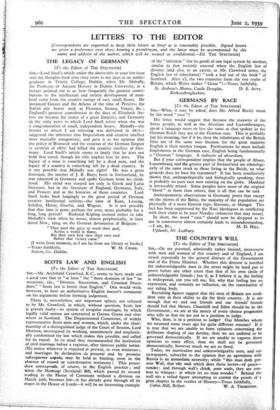SCOTS LAW AND ENGLISH [To the Editor of THE SPECTATOR]
SIR,—Mr. Archibald Crawford, K.C., seems to have made out a good case that in " at least " the " three domains of law " he mentions, viz., " Divorce, Succession, and Criminal Proce- dure," " Scots law is better than English." One would wish, however, to hear an authoritative English lawyer's comments on his arguments before forming judgement.
There is, nevertheless, one important sphere, not referred to by Mr. Crawford, in which, without question, Scots law is gravely faulty—its system of irregular marriages, by which legally valid unions are contracted at Gretna Green and else- where in Scotland. The Departmental Committee, of widely representative Scots men and women, which, under the chair- manship of a distinguished judge of the Court of Session, Lord Morison, investigated its working, unanimously and emphatic- ally condemned the law which makes this possible, and called for its repeal. In its stead they recommended the institution of civil marriage before a registrar, after timeous public notice. (No notice whatever is required at present, or even witnesses ; and marriages by declaration de presenti and by promise subsequente copula, may be held as binding, even in the absence of record or corroborative testimony.) This proce- dure corresponds, of course, to the English practice ; and when the Marriage (Scotland) Bill, which passed its second reading in the House of Commons without a division on March 3oth, becomes law—it has already gone through all its stages in the House of Lords—it will be an interesting example of the " infection " (for its good) of one legal system by another, similar to that recently enacted when the English law of divorce (and also, to an extent, as Mr. Crawford notes, the English law of inheritance) " took a leaf out of the book " of Scotland. After all, the two countries form the one realm of Britain, which Wales makes " Great "!—Yours faithfully,










































 Previous page
Previous page